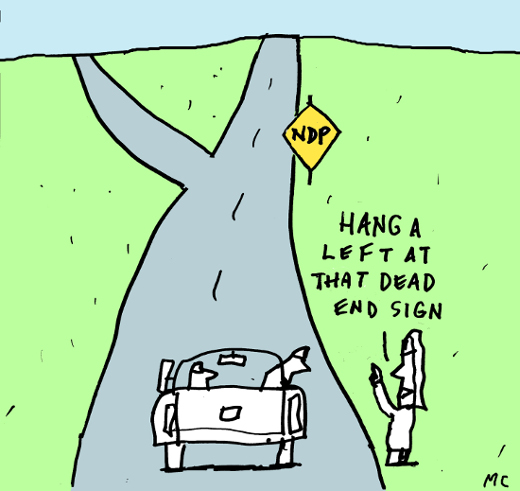Introduction: Crisis in Labour Politics
The issue that we can’t ignore this Labour Day is the disorientation in our movement’s politics. List the issues working people are most concerned about today – whether deindustrialization, unemployment and underemployment; access to healthcare, childcare and pensions; poverty, racism, conditions of foreign workers and appalling levels of overall inequality; the environment, transit costs and transit services; another corporate-friendly trade agreement that is insensitive to workers and communities; or the horror of Gaza – and two things especially stand out. First, how fundamental the actions of the Canadian state are to what is most important to us. Second, how distressingly unable we have been to influence those actions.

Exasperation with this response had surfaced in the past, but it reached a new level of disenchantment during the recent Ontario provincial election. The frustrations were of course not unique to this province. They mirrored the experience with social democratic parties across Canada as well as in Europe, Australia and New Zealand.
The confusions and divisions of Canadian labour over its political direction raise the question of whether it will continue to stumble along with a half-hearted (and no longer unified) commitment to the NDP or finally concede that the NDP is not the answer to its problems. Until such an acknowledgement occurs, labour’s politics will remain ineffective and largely irrelevant to working people (i.e. all those who don’t have the privilege of living off their financial assets or the power to live off the labour of others – those with and those without a union, the employed, unemployed, and those condemned to poverty by the ‘labour market’).
Moving On
Breaking with the NDP is a core condition for confronting the need to develop a more creative and fruitful politics. But it is only the first condition for moving on. The issue of what might follow is a difficult one and as the socialist left addresses this, it must do so – given our own lack of success – with humility. Though there are pockets of socialists in unions, movements, at universities and indeed in the NDP, there is at this moment no socialist left in Canada with any degree of coherence, significant ties to the labour movement, or a program and strategy adequate to addressing what the Canadian working class faces.
How then do we start a process to move beyond the NDP and make the question of moving to a socialist party a matter of serious discussion within the labour movement? This is inseparable from simultaneously advancing labour’s renewal, forging more substantive ties between unions and social movements, and reviving a socialist left.
The Contradictions of Social Democracy
The issue isn’t fixing the NDP or the problems with any particular leader, policy or tactic. It’s about the essence of the party. Social democratic parties like the NDP have no vision of a society beyond capitalism, no ambition beyond administering the existing society a bit more fairly. But capitalism is a social system based (as its name itself suggests) on putting the expansion of private capital above everything else, especially the well being of workers, whose potential to make gains can threaten capitalist control and profits. So while social democratic parties like the NDP claim to represent working people, the contradiction is that a party committed to capitalism cannot ultimately defend and advance the needs of working people.
The NDP tries to get around this lack of an independent vision by looking for ‘social harmony’ between capital and labour that looks to gains for working people without risking the alienation of business. It characterizes this as being practical. What it blindly ignores, however, is that for decades now business has asserted and demonstrated that it isn’t interested in any such ‘social contract’. And so while the ‘practical’ NDP has been running around naively mumbling about creating a ‘good capitalism’, its refusal to launch at least an ideological counter-offensive against corporate Canada has left its working class constituency largely disarmed. Among other things this risks leaving workers to find answers to their frustrations in the simplistic and false remedies of the right.
This conflict between supporting capitalism and supporting workers is directly related to another contradiction: the role of mass mobilization to bring about change. Challenging capitalism is no small task and demands the development of a broad and deep-rooted mobilized social force capable of taking this powerful system on. This can’t be done without workers playing a central role because of workers’ potential leverage in the economy and their organizational resources. Yet apart from certain individuals in the party, the NDP has little respect for working people as social actors. Since it can’t imagine ‘ordinary’ workers developing the capacities to one day play a leading role in transforming capitalism, it has no reason to concern itself with – never mind prioritizing – equipping working people with the vision, analysis, ideology, organizational skills and the structures to counteract the power of, and constraints imposed by, capitalism. The NDP consequently reduces politics from the complexities of building and mobilizing the working class to the restricted politics of focusing on the next election.
But voting itself is simply not enough to get real change. Moreover, to get that vote social democratic parties engage in ‘transactional’ politics – a politics driven by cynical trade-offs. The poorest sections of the working class don’t vote so don’t worry about them. The more politicized workers don’t really have anywhere else to go electorally, so they can be taken for granted. Minimum wages are opposed by small business, and big business is scared by anti-scab legislation, so don’t push too hard on these issues.
To be fair, the constraints that social democratic governments point to can’t be ignored; capitalism imposes well-known costs on any attempt to escape its established boundaries. But such constraints are in a sense also self-inflicted since social democracy does so little to prepare for stretching those limits or overcoming them. In fact, the NDP expresses its acceptance of these constraints as a matter of being realistic. But if being realistic means more or less giving up on significant change, then this is actually an argument for the need to become more radical. In the polarized state of the current world, where moderate solutions seem ineffective, solutions demand that we be more ambitious. The radical is now what is in fact realistic/practical – something that business has, from its own perspective, well understood and acted on.
In short, the NDP doesn’t really see itself as a workers’ party. Occasional rhetoric aside, it doesn’t think, or speak, or act in class terms. Social democracy runs from the very notion that class conflict is an integral part of capitalism – even as this is today more obvious than ever – and it recoils also from worker struggles as positive expressions of resistance that should be nurtured. When running for office, the NDP finds a militant working class and its economic disruptions a liability. In office, working class expectations stimulated by the electoral success are to be kept in check, and it is social democratic governments who so often end up carrying out wage restraint and social cutbacks – think Bob Rae. In the end, social democracy tends to confuse workers rather than develop their understandings, to lower rather than raise worker expectations, and in its transactional politics it contributes to the disorganization of workers as a class.
Out of the Frying Pan Into the Fire
In raising the spectre of leaving the NDP, one particular dead-end that has been tempting for some prominent unions must be rejected: responding to the NDP’s pragmatism by going one step further and arguing that because the Liberals are in power (or generally closer to being so), they can offer more than the NDP.
The history of the Liberal party and its business base should be enough of a warning against moving in this direction but there is an additional reason to oppose such a dangerous step. The bid on the part of some unions to make deals with the Liberals to address their own particular interests reinforces the sectionalism of the trade union movement. It undermines any counter-attempts to build, out of the disparate and different segments that make up the working class, the solidarity the class ultimately needs.
So, for example, making deals that grant union rights for only the construction sector, or joining with auto employers to support corporate subsidies in the midst of cutbacks for everyone else, or accepting a wage pattern that seems to fit teachers but undermines other education workers – all this may indeed lead to some short-term gains for particular workers. But since these deals aren’t rooted in the strength of labour but its weakness, they have not surprisingly delivered only relatively weak deals, vulnerable to reversal as circumstances or political leaders change. And when the unions involved find they cannot depend on these deals and need broader labour solidarity, they not surprisingly find themselves isolated.
Breaking with the NDP
A debate over the NDP is already percolating. But this itself won’t go anywhere unless the discussions are brought to a head. One way for this to happen is for activists to put forth resolutions to end their unions’ funding for the NDP (or the Liberals as the case may be). This would initiate a more formal internal debate over labour’s direction and open the door to a discussion of prospects for a socialist party and steps to get there.
An immediate issue would be the importance of preserving (or even increasing) the political funds formerly going to the NDP and addressing alternative uses to support the development of a new politics. One obvious use of the funds is putting them toward a mass mobilization of workers and their allies around campaigns. Another is support for social movements that are currently under-resourced, with limited ties to the labour movement and still far from being mass movements, but creatively and energetically involved in organizing the non-unionized sections of the working class and servicing and mobilizing around aspects of working class lives not generally addressed by unions.
“…counter austerity programs and instead demand the expansion of social programs such as the introduction of a comprehensive childcare program, something that especially speaks to the pressures on young working class families.”
In regard to campaigns, there are no shortages of potential struggles that address immediate needs and have a radicalizing potential. The tar sands link the environment, indigenous rights, Canada’s role as an energy supplier to the U.S., and the Conservative government’s determination to make Canada into an even more resource-dependent economy. The steady loss of manufacturing facilities raises the question of moving beyond the ransoms of ‘competitiveness’ and introducing planning to convert these productive capacities into useful products. There are also obvious social gaps to address, and provincial budgets in particular invite us to aggressively counter austerity programs and instead demand the expansion of social programs such as the introduction of a comprehensive childcare program, something that especially speaks to the pressures on young working class families. Such campaigns also suggest the revival of working class mobilization on a community-by-community basis on the model of the Days of Action.1
Among other things, such campaigns would aggressively counter austerity and demand the expansion of social programs like childcare.
As for contributing funds to social movements, it’s critical that this not replicate the division of labour experienced between unions and the NDP, in which union leaders sign checks and the social movements do the organizing/politics. The allocation of funds should involve building a two-way relationship: movements forging connections to union locals, unions assigning activists to work with movements as part of those activists’ education/training, movement activist sitting in on the labour educationals, joint strategizing on campaign priorities.
If at all successful, all this should inevitably pose new questions, not just about politics but also about union structures and strategies. How will, for example, the development of rank and file members into community organizers affect union tactics? How might this new direction change the relationship between the national office and the locals? What does all this mean for the role of staff and the kind of training staff would consequently need? What does it imply for the kind of research being done? What impact if any would it have on the bargaining process? Would the new context and emphasis on ‘class’ encourage greater co-operation among unions, especially in citywide organizing drives of precarious workers? Where does the CLC fit into such shifts; will it, under its new leadership, revive the campaign for a universal liveable pension but this time, do so with the serious mobilizing such a campaign demands? Should labour councils start including representatives of movements in their meetings? Should unions and movements introduce new regional structures such as class-based, community assemblies open also to non-union and unemployed workers and addressing community as well as workplace-based issues?2
Canadian labour’s own history in the last quarter of the 20th century included impressive examples of labour leaving its political arm aside to directly take up and lead political struggles. In the mid-70s, organized labour launched a one-day general strike against wage controls, the first such action in North America since the 30s. In the mid-80s, labour and its movement partners carried out what was perhaps the most impressive anti-free trade campaign in the developed world. And in the mid-90s, labour and the movements came together again in a remarkable series of rotating community-wide general strikes spread over two and a half years (the Days of Action). These mobilizations did not however reverse policies and for the NDP this confirmed the limits of unions acting as their own political arm or linking up with other social movements.
But how we measure success and failure and what we learn from struggles depends on our goals and how we understand ‘politics’. For the left, a more telling lesson was the revealed potential of such mass struggles, especially the Days of Action: the education done to get people to leave their workplaces; the numbers of workers and students experiencing activism for the first time; the organizing skills developed; the links made outside the workplace.
To conclude that we should therefore go back to politics as usual would have been the worst possible lesson. A more profound lesson was that militancy and protest are only the beginning of a struggle; there must be mechanisms for sustaining and building on the potentials emerging. The NDP clearly had no interest in fostering such opportunities, and at the time the unions and movements proved incapable of doing this on their own. Disparate socialists, for all their enthusiasm, also failed to take advantage of the openings created. The real message was the importance of having a political organization with its feet both inside and outside particular unions and movements, with the commitment and capacity to give these temporary protests a permanent legacy – a socialist party.
Beyond the NDP: A Party of a New Kind
The crisis of labour politics calls out for a widespread debate on the necessity of an alternative party, a socialist party. This is hardly a new idea; socialists inside and outside the union movement have long argued for ‘a party of a new kind’, though not always agreeing about exactly what it would look like. In Europe, important though uncertain initiatives are taking place in developing such a party and in 2006 a related experiment was also started in Quebec. Activists need to pay serious attention to these developments.
Socialist parties are distinguished first of all by their commitment to working people and their vision of an egalitarian, solidaristic society that supports the full development of the potentials of all. Socialists understand that this can’t be done without reaching beyond capitalism with its class divisions, subordination of all values to the pursuit of competitiveness and profits, and thin democracy limited by minority control over the economy and communication. Socialists may admit to capitalism’s past achievements, but far from accepting capitalism as the best form of society we can aspire to, they see capitalism as having become a barrier to further human progress.
To see the political project in these terms leads, as emphasized above, to redefining how we think about ‘politics’. The radical changes envisioned demand an appreciation that working class politics must go far beyond the vote (which is not to say that elections are irrelevant) and address how to build the working class into a confident social force capable of challenging capitalism and transforming society.
In placing working people at the center of socialist politics there is, however, nothing that guarantees that workers will spontaneously act as a class or do so effectively. The purpose of a socialist party is to work toward making a cohesive class out of dispersed and individualized workers through actively creating and supporting structures that respect the ability of ordinary people to analyze and understand complex issues, to evaluate options and strategize, to organize, and to act decisively. It’s only in the context of building such a base among workers and coordinating broader progressive forces that electoral politics begins to take on more substantive significance.
The problem of course is that there is no credible socialist party in English Canada and that a small group cannot simply ‘announce’ its formation. The question therefore is what labour activists supportive of such a project should be fighting for in their organizations and outside to facilitate the emergence of such a party?
The Interim Role of Socialists
What committed socialists have to offer, at least those who see the fundamental importance of the role of workers and their organizations in achieving radical social change, are their analytical, educational and organizing skills. Socialists can provide analyses of economic and political trends, historical background on past struggles and labours’ forgotten history, and reports on developments abroad. They can work on educational material such as study outlines, reading material, pamphlets on specific topics and offer speakers ready to present critical ideas and engage workers in discussion. And they can organize spaces for further discussion and outreach, such as forums for activists and forums for the general public.
Two especially critical contributions of the left are bringing the idea of socialism back into activist discussions and ensuring that this is consolidated through the ‘making of socialists’ – identifying and developing a layer of workers into confident leaders and organizers who understand capitalism, hold a vision beyond it, and are in the struggle for the long haul.
Much of this therefore revolves around both educating ourselves, and developing popular forms of education to engage those not yet convinced. Such education, more ambitious in content and reach than what is currently done in the trade union movement, might begin with workers’ immediate concerns, place them in a broader context, and move toward what kind of politics might address them. Why are workloads increasing across workplaces? What is austerity? Why isn’t childcare on the political agenda? Why does inequality keep growing? Why can’t anyone who wants to work get a decent job? Is it compatible to talk of solving the environmental crisis while also maintaining capitalism? What do we mean by capitalism, globalization, neoliberalism, the state and class? Where did the idea of socialism come from? How are people elsewhere responding to the crises in their lives and to politics? What lessons can be learned from their experience? What skills and structures do we need if we are to actually change things?
But education of course can’t take place in a vacuum. Absent on-going struggles, education can seem beside the point to people dealing with the problems of everyday life. Fighting for change on the other hand, raises questions that make education relevant. The interruption to normal life occasioned by struggles brings opportunities for socialists to engage workers on a terrain more favourable to raising radicalizing issues. The interaction of struggles and education is inseparable from generating organizers and inspiring interest in broader battles and deeper analyses. This cannot happen, we have learned, out of the good will of individuals. It requires proactive, organized interventions. As for existing socialists, the hope would be that if and as labour opens up to a new politics, this might stimulate the socialist left itself to come together as a more productive entity.
Conclusion
It’s fair to ask whether we are setting ourselves an impossible task in trying to ‘accelerate’ history. The actual capacities of the labour movement are mixed. The likelihood of trade union leaders fully supporting the process outlined here without pressures from below is low. And the prospects of such pressures being imposed seem unlikely given union members that are so demoralized, overwhelmed by the daily stresses of work and family, have no access to independent research and are also cut off from their own history, relatively isolated from other workers, and have limited knowledge of related developments abroad. Moreover, we’re not in the midst of the kind of historic upsurge in social struggles that might give such a project its oxygen. Wouldn’t it in this context be better to wait?
But wait for what? Waiting is not a strategy. Nothing is going to magically emerge to save us. And whatever does occur or whatever alternatives others come up with, the contradictions of the labour movement and the limits of the social movements and the left will still have to be addressed. Success is certainly not guaranteed but stumbling in the dark with no direction should hardly ease our uncertainty. We need to thoughtfully lay out a direction, to experiment, and to evaluate and learn as we go along so we are ready to try again and to try differently. We’ve already been waiting for far too long.
We have, in summary, laid out four steps here. First, activists in the trade union movement must organize themselves to end the NDP’s bankrupt lock on the labour movement’s politics. Second, we must clearly reject shifting the break with the NDP toward the right (i.e. by supporting the Liberals) and fight to direct the funds formerly contributed to the NDP into mass mobilization campaigns in alliance with social movements organizing on the ground. Third, to also allocate such funds to supporting the capacity of class-based movements supplementing and going beyond the work of unions and to do so in a way that integrates these movements and union activists at the base. Fourth, we’ve emphasized the need to initiate discussions in workplaces and communities that explicitly address a socialist party.
There are currently a good many individuals doing great political work but they are spread across the activist diaspora as independent and relatively isolated actors. Moreover, their preoccupation with their particular activity doesn’t address the issues confronting the working class as a whole. If we are to seriously face up to those larger challenges, we have to develop a project that connects these individuals and coordinates the pursuit toward a shared national political project. It means developing a socialist political analysis that addresses our times and distributes it among labour and movement activists for further discussion and strategizing. Past experience should make it clear that this cannot happen without developing an organizational capacity to act collectively and this in turn demands having full-time organizers – paid for out of a levy based on ability to pay – to help us pull together and facilitate everything that needs to happen but simply does not when such a capacity is absent.
Discussions on all this do not have to wait. The capacity certainly exists to hold meetings in Toronto, Ottawa, Halifax, Winnipeg, Edmonton and BC to bring together those interested in moving to a new politics and to assess possibilities. Some coordination of those discussions will be needed, to learn from the variety of experiences that occur, move to some common infrastructure of analysis, information and materials, and also to play a role in encouraging further meetings to advance the discussion in many more communities.
If these ideas resonate, get in touch with us at workingclassreboot@gmail.com. •





